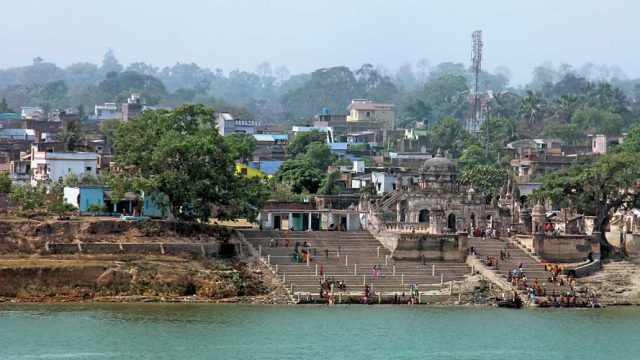Bhagalpur is one of the largest towns in Bihar. The city was considered a relatively important trade centre in eastern India by the 7th century Chinese travellers Hieun-tsang and Fa-Hien. It once had a large harbour on the River Ganges at a place called Champanagar, now called Champanala, which flows by the present-day western boundary of the city near Nathnagar. During an archaeological excavation, boats and coins originating from the Middle and Far East were found.
THINGS TO SEE AND DO
Today, Bhagalpur is most known for its silk, apart from its tombs and shrines that can be visited.
Kuppa Ghat
Located on the bank of the River Ganga, Kuppa Ghat is most famous for the ashram of Maharshi Mehi Paramhans, one of the leading exponents of sant mat, a spiritual movement that has its origins in the 13th century.

There is a landscaped park, several temples, a bookstore and a library on the premises of the ashram. The major attraction, however, is a cave (kuppa means cave) with many subterranean passages. It is said that Maharshi Mehi retreated into the cave from March 1933 to November 1934 and emerged after he attained enlightenment. The entrance to the cave is locked, but you can ask at the office for permission to enter.
The ashram offers residential facilities to those who wish to meditate or study.
TIP Photography is prohibited at the ashram
Tomb of Ibrahim Hussain Khan
The tomb of Ibrahim Hussain Khan is a fine specimen of late Mughal architecture. Francis Buchanan, a Scottish physician and geographer who visited the mausoleum in 1810, claimed that it was far better than other Muslim monuments of the same period in northern Bihar.
The monument is constructed on a high battlemented plinth, with octagonal towers on each of its four corners (only the base of these towers now survives). The tomb consists of a central chamber enclosed by a verandah, each side of which has five arched openings. The mausoleum is rectangular in plan with a central pointed dome surrounded by four domed kiosks or chhatris. There are decorative finials on the roof at each of the four corners and a monumental gateway to the south.

The tomb is located in a lane opposite the Sundarwati Mahila College (known simply as SM College) in the Khanjarpur locality of Bhagalpur. If you are standing facing SM College, walk towards the right and then turn at the lane on the right. Keep walking till you hit a T-point, then take the right fork. This winding road going uphill through a dense residential cluster leads to the tomb. Despite its interior location, it is easy to find as the roof of the monument towers over the neighbouring areas.
Khanqah-E-Shahbazia
Founded in 1577 AD, the Khanqah-e- Shahbazia is one of the most revered shrines of Bhagalpur. It houses the grave of Maulana Shahbaz, a saint whose 13th-generation descendants still run the place. The Sajjadah Nasheen (direct descendant of the saint) is supposed to spend his life within the confines of the Khanqah and take care of its management, lead prayers and offer spiritual services. It is said that they are exempted from appearing in a court of law.
The shrine is popular with people of all religions and on Thursdays and Fridays, huge crowds come to seek the blessings of the saint.

Next to Maulana Shahbaz’s mausoleum, there is a black-domed mosque which is thought to be the oldest in Bhagalpur. The Khanqah is also famous for its library, which has a vast collection of Arabic and Persian theological texts, including a copy of the Qur’an transcribed by Murshid Quli Khan, the Nawab of Murshidabad.
Contact the office at the Khanqah for more information about the shrine and access to the library.
Timings Saturday-Wednesday – 5.00-10.00am; open all day on Thursdays and Fridays Tel 0641-2423274
Bhagalpur Museum
The Bhagalpur Museum is located near the Kachehri (District Court). It houses statues of deities, artworks, coins, manuscripts and sculptures.

Jain Temple, Nath Nagar
Known as Shri Champapur Digamber Jain Siddha Kshetra, this temple is sacred for Jains as it is believed that the 12th Tirthankara, Vasupujya was born at Nath Nagar. The architecture of the entrance gate of the temple is inspired by the Hawa Mahal of Jaipur. Inside the temple, there are many large mirror-lined glass panels illustrating mythological stories.
Nath Nagar is about 4 km away from Bhagalpur station. Frequent shared autos connect the two.
WHERE TO STAY AND EAT
Hotel Bhawna International (Tel: 2408010-11, Cell: 09934426614; Tariff: ₹1,100-3,000) is one of the nicer options in town. The rooms have balconies and the service is decent. Hotel Sai International (Tel: 2301486-87; Tariff: ₹1,699-4,100), located in front of the railway station, offers a restaurant as well as a bar. Hotel Rajhans International (Tel: 2409411-14, Cell: 09308189201; Tariff: ₹1,490-3,490) has clean rooms, two eateries and an icecream parlour. Budget choices here include Mahavir Hotel (Tel: 2408519; Tariff: ₹700-1,000) and Laxman Niwas (Tel: 2409537; Tariff: ₹300-500).
Most hotels here have on-site restaurants. You can also try out Royal Darbar Restaurant on MG Road, which offers standard Chinese and north-Indian dishes.
When to go October to March Location On the banks of Ganga in eastern Bihar Air Nearest airport: Patna Rail Nearest rail: Bhagalpur




